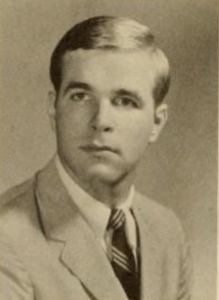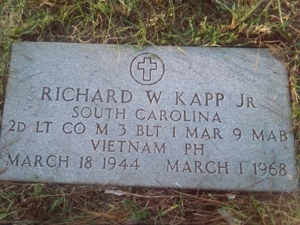Scroll of Honor – Richard Worrell Kapp, Jr.
‘This Was a Man’
Written by: Kelly Durham
Richard Worrell Kapp, Jr., “Dickie” to his friends, was impressing people long before he arrived on the Clemson College campus. Kapp was from Orangeburg, where his friend Carolyn Stone Lewis remembered, he “excelled at EVERYTHING he did.” “Everything” included Boy Scouts, academics, work, and sports.
Daniel Brailsford was a friend and coworker during summer breaks from school. “Dickie and I toughened up by working construction. We installed roofing and insulation for a home builder the first summer and, the summer before our senior year, we worked for Daniel Construction which was building a tool plant, Utica Drop Forge, outside of Orangeburg. That summer we drove lay-out stakes, hauled block and lumber around the site, and wired together mats of rebar across the bottoms of huge square pits dug out of the clay. At the end of every day, Dickie would come back to the car covered with sweat and grime, but still smiling impishly. Dickie liked hard work. He took pride in whatever he did.”
Dickie’s work ethic helped him build an impressive record at Orangeburg High School. A two-way starter on the football team, Dickie was a powerful linebacker who, according to Brailsford, “hit like a piston.” One of the team’s captains, he was described by the Times-Democrat newspaper as “a sixty-minute man when the going gets tough.” Dickie’s achievements were not restricted to sports. He was a strong student, a member of the student council, and served as president of the Key Club, a profile which earned him Orangeburg High School’s coveted Bill Davis Trophy, awarded annually to the person who best displays the qualities of scholarship, athletic ability, and sportsmanship.
Dickie exhibited the same discipline and leadership traits at Clemson, where he enrolled as a member of the Class of 1966. A history major, Kapp was a member of the Numeral Society, Phi Kappa Phi national scholarship society, and Phi Eta Sigma national honor fraternity. He was a member of the Young Republicans and served on student government’s high court.
Fraternity brother Steve Hixson described Kapp as “the most focused, mature, sincere, and all-around nicest person I had ever met,” adding that Dickie was a role model for putting studies first. At Clemson, as he had in high school, Dickie achieved an enviable record. He applied and was accepted to law school, but there was something else he felt called to do first. Dickie volunteered for the Marine Corps, according to his cousin Lloyd Kapp, because “he felt he was duty bound to serve his country.” Fraternity brother Dave Merry agreed. “He believed in what he was doing and what the country was doing and was looking forward to leading a marine platoon even though he was fully aware of the life expectancy of such a position.”
Kapp graduated from Clemson on December 17, 1966. He reported to Quantico, Virginia for Marine Corps Officer Basic Training School, Class 6-67 which convened on June 1, 1967. Also in the class was Kapp’s Clemson classmate, Stephen Hilton. Both young alumni graduated as Second Lieutenants on November 1, 1967. Their Quantico class sent more lieutenants off to battle and suffered more combat casualties than any Basic School class since the Korean War. Sadly, both Kapp and Hilton would be included in this tragic tally.
After completing his basic training, Second Lieutenant Kapp was sent to Camp Schwab, Okinawa in December 1967. He arrived in Vietnam in January 1968 and was assigned as platoon leader of 2nd Platoon, M Company, 3rd Battalion, 1st Marines. His unit was assigned the mission of engaging and destroying elements of the North Vietnamese Army which had been interdicting traffic along the Qua Viet River in  northern South Vietnam. The North Vietnamese were seeking to disrupt a vital supply link between the sea and the Marine Corps’ Dong Ha combat base in preparation for their upcoming surprise Tet Offensive.
northern South Vietnam. The North Vietnamese were seeking to disrupt a vital supply link between the sea and the Marine Corps’ Dong Ha combat base in preparation for their upcoming surprise Tet Offensive.
The largest village in 3rd Battalion’s area of operations was Mai Xai Tsi, the site of two major battles, one on the last day of January and the other on the first day of March. John Potts was a squad leader in Kapp’s platoon. “On March 1, 1968, Lt Kapp led his platoon of thirty-five marines into battle in the North Vietnamese Army occupied village of Mai Xai Tsi, along the Qua Viet River about 10 miles south of the Demilitarized Zone. The entire 3rd Battalion was involved in the attack and met heavy resistance. Causalities were heavy and continued to mount throughout the day. Despite the loss of his platoon right guide, two squad leaders, his radioman, and about a dozen other men, Lt Kapp continued the attack deep into the village. In the late afternoon, Lt Kapp was reorganizing the remaining members of his platoon when an unobserved NVA soldier rushed from behind a structure and fired a burst from his AK-47 automatic rifle. Tragically, Lt Kapp and his platoon sergeant were killed instantly, but his last spoken words served as a warning to the other members of the platoon, preventing additional casualties.” Potts remembered his platoon leader as “quietly confident,” someone whose “lack of fear in the face of extreme personal danger distinguished him as a leader and served as an example to all who served with him.” Potts recalled that Lieutenant Kapp “treated his men with respect, and related his trust in those of us who had been in-country for some time and encouraged us to help the newer guys… We were all willing to follow him into battle.”
After his death, the Numeral Society at Clemson, now SAE fraternity, named its pledge award in Dickie’s honor. Orangeburg High School created a scholarship in his memory which is awarded each year to a deserving senior. The school’s principal, Eugene Smith eulogized Kapp in the Orangeburg newspaper. “All teachers in the public schools,” he began, “have the privilege of knowing truly worthy, open-faced, clear-thinking young men.” He described Dickie Kapp as “quietly sincere… modest but confident,” someone who “earned respect and love by becoming what many of us wish to become – a clean-cut, solid thinking, a willing and responsible giver of his talents and strength.” Smith concluded by quoting Shakespeare. “His life was gentle, and the elements so mixed in him that Nature might stand up and say to all the world, ‘This was a Man.’”
Richard Worrell Kapp, Jr. was awarded the Purple Heart, Combat Action Medal, Presidential Unit Citation, Navy Unit Commendation, National Defense Service Medal; Vietnam Service Medal; Republic of Vietnam Gallantry Cross with Palm, Individual Award for Valor; National Order of Vietnam Medal, 5th Class; Republic of Vietnam Gallantry Cross Unit Citation with Palm; and Republic of Vietnam Campaign Medal.
Medal.
Kapp was survived by his mother, stepfather, sister, and brother. He is buried in Orangeburg’s Sunnyside Cemetery.
For more information about Second Lieutenant Richard Worrell Kapp, Jr. see:
https://soh.alumni.clemson.edu/scroll/richard-worrell-kapp-jr/
For additional information about Clemson University’s Scroll of Honor see:
https://soh.alumni.clemson.edu/
